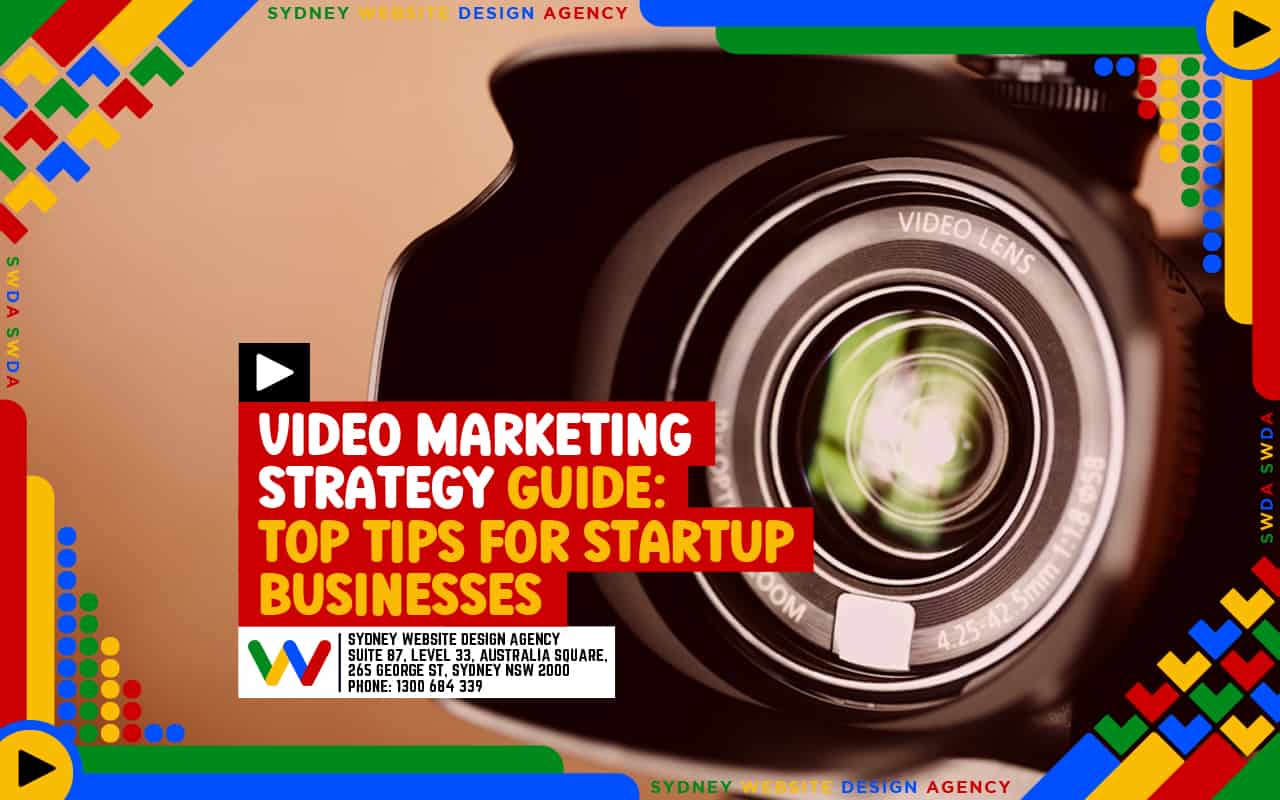Investing in Video Marketing: A Vital Strategy for Startup Success

As a startup business, it can be quite difficult to find your position against your competitors who have been around years ahead of you. The competition can be tough. Thus, investing in a robust marketing strategy is a must. One of these strategies is video marketing.
Video marketing can be a very effective way to reach out to your target audience and promote your product or service. It is an engaging way to communicate with potential customers, and it can also help improve your search engine optimisation (SEO).
Introduction
You know you need to be marketing your startup business, but you’re not quite sure where to start. There are so many options, and it can be overwhelming to try to figure out what will work best for you. But did you know that video marketing should be a key part of your strategy?
Anyone who has ever attempted to start a business can attest: growth is tough. Startups must achieve large development if they are to survive. Their existence relies on quick, money-making activities. Without results, investment funding will quickly run out, since investors demand substantial returns on their investments.
The use of video marketing has grown increasingly common and effective than ever before. It is an interactive type of content that can bring in leads and organic traffic to your brand. This stellar marketing effort can do a lot of good for your business, but how can you use it effectively? Continue reading to learn more about this marketing tactic.
Table of Contents
What is Video Marketing?

Small-business video marketing is neither as difficult nor costly as you may believe. You already have a video camera in your phone if you’re reading this text on a mobile device. Creating videos nowadays is not as expensive as it was used to be.
It is commonly said that an image can be worth a thousand words. However, for video content, multiply that number by another thousand. This is the power of video marketing at its core–fully engaging your audience through multiple senses as part of your marketing strategy.
Video marketing is the practice of utilising films to advertise and inform consumers about your product or service. It helps you increase interaction on your digital and social channels, educate your audience, and allow you to reach them with a new medium.
You can produce marketing films that amaze your audience with some thought and a dash of creativity. All you need to transform your videos into professional marketing materials is a few video software. If you’re still on the fence about the importance of video for your business, especially if you’re a little one, here are some statistics to change your mind.
- Seventy percent of all internet traffic is now video.
- More than 500 million hours of videos are watched on YouTube every single day.
- Sixty-six percent of users say they would prefer to watch a video about a product than read about it.
- Fifty-seven percent of marketers say that video has helped them increase sales, and 43 percent say it has directly
led to increased revenue.
Video marketing provides a massive opportunity for small businesses to get noticed. If you’re not utilising this powerful tool, you are missing out on a chance to connect with your customers and boost your bottom line.
Benefits of Video Marketing for Small Businesses

Videos makes it easier to communicate a story. Be it a reason why you launch such service, or how such products can change the way you do things in your life. Videos translates these stories into content that your audiences can easily consume.
Stories are essential for businesses because they help build empathy with potential customers and create a more human connection. Stories also allow businesses to answer the essential why’s surrounding the marketing of their products and services, which can move greater audience numbers towards sales.
So, what are its benefits?
Better Brand Recall
Well, for starters, video production is a great way to improve your brand’s recall value. If you tell a story that resonates with your target audience, they are more likely to remember your name when they see it again. This is essential for building a successful business, as it increases the likelihood of customers using your products or services.
Increases Website Engagement
Furthermore, video production can also help increase website traffic and engagement. A study by Content Marketing Institute showed that including videos on landing pages can increase conversion rates by 80%
People are more likely to watch a video than read text, which means that if you have an engaging and informative video on your website, viewers are more likely to stick around and explore what you have to offer.
Builds Trust and Credibility
Another important benefit of having a video content strategy is that it can help you build trust and credibility with your target audience. If you create videos that are honest and transparent, viewers will be more likely to trust your brand. This is essential for any business, as customers are more likely to purchase products or services from brands they trust.
Improved SEO Rankings
In addition, creating video content can also improve your website’s SEO rankings. This is because Google gives preference to websites that include video content. So, if you want your website to rank higher in search engine results pages, then you should definitely consider investing in video production.
Better Conversion Rates
A video marketing strategy can also lead to improved conversion rates. This is because videos are more likely to persuade viewers to act than text or images alone. If you include a call-to-action at the end of your videos, you can increase the likelihood of viewers taking the desired action, whether it’s subscribing to your email list, buying your product, or something else. It can be the top of your marketing funnel and may generate results beyond your imagination.
Improves Bounce Rate
Another great thing about having a video marketing campaign is that it can help improve your website’s bounce rate. This is the percentage of people who leave your website after only viewing one page. A high bounce rate is bad for business, as it indicates that people are not finding what they’re looking for on your website.
However, if you include videos on your website, you can keep people engaged for longer, which will reduce your bounce rate and improve your chances of conversion.
Overall, a video marketing strategy offers several benefits that can help you improve your business. So, if you’re looking for a way to take your business to the next level, then you should certainly consider investing in video production. Contact a video production company today to get started.
The benefits of video production and having a solid video marketing strategy are numerous, but some of the most important ones include improved brand recall, increased website engagement, built trust and credibility, improved SEO rankings, and better conversion rates. If you’re looking for a way to take your business to the next level, then video production is definitely something you should consider.
Informative or Engaging: Which Video Works Best

As a business owner, you’re constantly investigating how to better connect with your target audience and promote your brand. One way to do this is through video content. But what kind of video should you create? Is it more essential to be informative or engaging?
The answer may depend on your goals and objectives. If you’re trying to raise awareness about your brand or educate potential customers about your products or services, then an informative video might be the way to go. On the other hand, if you’re looking to build relationships and connect with potential customers on a more personal level, then an engaging video might be a better option.
Here are some things to keep in mind when deciding which type of video is right for your brand:
- What are your goals?
- Who is your target audience?
- What kind of message do you want to communicate?
- How much time and budget do you have to produce the video?
Once you’ve answered these questions, you should have a better idea of which type of video will work best for your brand. If you’re still not sure, why not create both types of videos and see which one resonates more with your audience?
What are the best types of marketing videos ideal for your audiences?
All businesses are in a mad dash to produce more video content. But with over 300 hours of video being uploaded to YouTube every minute, how can you ensure your videos stand out from the crowd and deliver results for your business?
It all comes down to understanding your audience and what type of video they’re most likely to engage with. Not sure where to start? We’ve put together a list of the best types of video marketing campaigns for different types of audiences:
1. How to Videos
If you want to get in front of an audience that’s actively searching for information on how to do something, then a how-to video is the way to go. These types of videos are designed to educate your audience on a specific topic, and they can be as short or as long as you want them to be. Be it an animated video or a more professional one, this type of video strategy is one of the most common but helpful video marketing strategy you can offer your audiences.
2. The Product Video
A product video is the perfect way to show off your latest product in all its glory. Whether it’s a new app, piece of technology, or physical product, a well-made product video will give potential customers a taste of what it’s like to use your product and how it can benefit their lives.
3. The Brand Awareness Video
A brand awareness video is all about getting your name out there and building recognition for your business. These types of videos are usually shorter and focus on introducing your company, sharing your story, and highlighting your unique selling points. Such types of videos are ideal for social media posting and for emails and newsletters with video attachments.
4. The Customer Testimonial Video
A customer testimonial video is a powerful way to build trust and credibility with your audience. These videos feature real customers talking about their experiences with your product or service, and they can be an incredibly effective marketing tool.
5. The Animated Explainer Video
Animated explainer videos are perfect for businesses that want to explain a complex concept in a simple and engaging way. These videos use animation and graphics to break down difficult topics, making them easy for even the most novice of viewers to understand.
Hopefully, this list has given you some ideas for the types of video marketing campaigns you can produce for your business. Remember, it’s all about understanding your audience and what type of content they’re most likely to engage with. Once you know that, you can produce videos that will deliver results for your business.
Top Tips for Successful Video Marketing Campaigns

The news is already out. If you want to succeed with your content plan, you must incorporate video content into your marketing strategy. According to a recent HubSpot survey, 54 percent of consumers would rather see a business-specific videos than other sorts of content.
In an increasingly competitive market, people are more focused on the way in which videos are created by businesses than ever before. Video content does not appeal to everyone, putting pressure on individuals to provide a professional and engaging video in a very personal manner. However, there are a variety of methods you may use to ensure that even the most camera-shy person can create the greatest video marketing campaign ever. Here are some ideas for making your video go viral.
Produce high-quality videos
There is no one-size-fits-all answer to this question, as the best way to produce high quality videos will vary depending on the specific project requirements. However, there are a few key tips that can help ensure your videos are of the highest possible quality:
1. Plan ahead and be prepared.
Before starting to shoot your video, it is important to take the time to plan out your project. This means having a clear idea of what you want to achieve with your video, as well as what story you would like to tell. Once you have a solid plan in place, you can then start to think about the best ways to execute it. This might include things like creating a storyboard or shooting script, as well as sourcing any necessary props or locations.
2. Invest in quality equipment.
If you want your videos to look professional, it is worth investing in some high-quality equipment. This might include things like a DSLR camera, tripod, and lighting kit. However, it is also critical to remember that you don’t need the latest and greatest gear to produce great results – sometimes, even a smartphone can be enough.
3. Shoot in high definition.
When shooting your video, make sure to do so in high definition (HD). This will ensure that your footage looks crisp and clear, and will be much more enjoyable for viewers to watch. Additionally, shooting in HD will also make it easier to edit your video later on.
4. Pay attention to audio.
In addition to shooting high-quality video, it is also important to pay attention to the audio. This means using a quality microphone to record any dialogue, as well as ensuring there is no background noise in your footage. Again, paying attention to audio can make a big difference in the overall quality of your videos.
5. Edit carefully.
Once you have all of your footage shot and collected, it is time to start editing. This is where you will put everything together and turn it into a finished product. When editing, take your time and be careful not to cut anything out that is essential to the story you are trying to tell. Additionally, pay attention to things like transitions and music, as these can also have a big impact on the quality of your final video.
By following these tips, you can help ensure that your videos are of the highest possible quality. However, it is also important to remember that practice makes perfect – the more you shoot, the better you will become at producing great results.
Target your audience
It’s straightforward. If you have no idea who you’re trying to reach with your message, any marketing, whether it be video marketing or otherwise, will miss the mark. As a result, the first step in launching video marketing for your business is to precisely identify your target audience.
The truth is that the more you can understand your consumer, the better equipped you will be to meet their demands.
Understanding your audience well is crucial for comprehending not just how you’ll communicate to them through video, but also what sort of material they’ll be interested in.
There are many factors that contribute to your target audiences’ online viewing engagement behaviours. Some of these include age, gender, interests, habits, and geographical location. It’s important to consider all of these elements as part of an effective online video strategy. There are three levels to this:
Demographic
This is the most basic information about your target audience, such as age, gender, and location.
Psychographic
This information dives a bit deeper to understand your audience’s interests, habits, and values.
Behavioural
Finally, this level helps you understand how your target audience interacts with video content online. Do they watch videos on their phones? On their laptops? How often do they watch videos? What types of videos do they prefer?
Once you have a good understanding of whom you’re trying to reach with your video marketing campaign, you can start thinking about the best ways to produce and distribute engaging video content that will resonate with them.
When it comes to online video marketing, distribution is just as important as production. To reach your target audience, you need to make sure your videos are being seen by the right people in the right places.
There are many ways to distribute your video content online. Some common methods include:
- Uploading videos to social media sites like YouTube, Facebook, and Instagram
- Embedding videos on your website or blog
- Sending videos via email marketing campaigns
- Using paid advertising platforms like Google AdWords and YouTube Ads
No matter what method or combination of methods you choose to use, the most influential thing is that you’re strategic about it. Make sure you’re reaching your target audience, where they are spending the majority of their time online.
Video marketing can be a great way to connect with your target audience and build a strong relationship with them. But it’s essential to remember that, like any other form of marketing, it takes time, effort, and strategic planning to produce results.
If you’re considering launching a video marketing campaign for your business, take the time to properly identify your target audience first. Once you know who you’re trying to reach, you’ll be in a much better position to produce engaging video content that resonates with them.
And when it comes to distribution, make sure you’re reaching your audience where they are spending the majority of their time online. By following these simple tips, you’ll be on your way to success with video marketing.
Create a video marketing strategy
There’s no denying the power of video when it comes to marketing. In fact, including video in your marketing strategy is essential to reach today’s consumers. After all, people are more likely to watch a video than read an article or view a static image.
If you are not sure where to start? Creating a video marketing strategy doesn’t have to be complicated or time-consuming. Just follow these simple steps:
1. Define your goals
Before you start creating videos, it’s important to know what you want to achieve with your video content. Do you want to increase brand awareness? Drive traffic to your website? Generate leads? Convert customers? Once you know your goal, you can create content that is designed to achieve it.
2. Research your audience
It’s essential to know who you’re creating content for. What are their interests? What do they want to see from your brand? Answering these questions will help you create videos that resonate with your target audience.
3. Select the right platform
There are a number of different video platforms to choose from, so it’s important to select the one that makes the most sense for your brand and your goals. For example, if you’re looking to generate leads, you might want to post your videos on LinkedIn. If you’re trying to increase brand awareness, YouTube might be a better option.
4. Decide on a format
Once you know what platform you’ll be using, it’s time to decide on a video format. There are a number of different formats to select from, so it’s critical to select the one that best fits your goals and your audience. For example, if you’re trying to increase brand awareness, a product tour might be a good option. If you’re looking to generate leads, an explainer video might be a better option.
5. Create compelling content
No matter what format you choose, it’s important to create compelling content that resonates with your audience. Your videos should be informative, entertaining, and engaging.
6. Promote your videos
It is not enough to create video content. Once you’ve created your videos, it’s important to promote them through your other marketing channels. You can post them on your website, share them on social media, or even include them in email marketing campaigns. From social media videos to informational videos – each one of them should be promoted accordingly.
7. Measure your results
Finally, it’s important to measure the results of your video marketing strategy. This will help you determine what’s working and what’s not, so you can adjust your approach as needed.
Use social media to share your videos
Social media is a great way to share your videos with a wider audience. Not only can you post your videos on your very own social media channels, but you can also share them on other people’s channels (with their permission, of course).
Here are some tips for promoting your videos on social media:
1. Use hashtags
Hashtags are a great way to promote your videos on social media. When you use relevant hashtags, you can reach a wider audience and get more people to watch your videos.
2. Share behind-the-scenes content
People love seeing behind-the-scenes content. So, if you have any footage from the making of your videos, be sure to share it on social media. This will give your audience a look at the creative process and make them more interested in your videos.
3. Collaborate with other brands
If you collaborate with other brands, you can reach a wider audience and get more people to watch your videos. For example, if you’re a clothing brand, you could collaborate with a makeup brand to create a fashion tutorial video.
4. Host a contest or giveaway
People love contests and giveaways, so hosting one is a great way to promote your videos on social media. Just be sure to make the rules clear and choose a prize that will appeal to your target audience.
5. Use paid advertising
If you really want to reach a wider audience, you can use paid advertising on social media. This will help you get your videos in front of more people, and you can target your ads to specific demographics.
Optimising videos for search engines and social media platforms
As we all know, videos are a great way to improve your website’s SEO. But how can you make sure that your videos are optimised for social media and search engines? Here are some tips:
1. Use descriptive and keyword rich titles
Just like with blog posts, your video title should be descriptive and contain keywords that people are likely to search for.
2. Create transcripts of your videos
Transcripts are great for two reasons. First, they help search engines index your video content, so people can find it more easily. Second, they provide a text version of your video for people who prefer to read rather than watch.
3. Optimise your thumbnails
Make sure that your thumbnail image is high quality and descriptive. This will help it stand out in search results and on social media sites.
4. Use tags
Tags are another way to help people find your videos. Be sure to use relevant, keyword rich tags that accurately describe your video content.
5. Promote your videos
Once you’ve optimised your videos for social media and search engines, be sure to promote them! Share them on your website, blog, and social media accounts. You can also submit them to video sharing sites like YouTube and Vimeo.
Measure the success of your videos
When you upload a video to YouTube, you have the option to add annotations. These are little notes that pop up on the screen during the video, and can be used to promote your website or other videos. You can also use them to measure the success of your video marketing campaigns by adding links to Google Analytics.
To set this up, first go to your YouTube account and click on the My Videos tab. Then, click on the Edit button for the video you want to track. Under the “Annotations” tab, you’ll see an option to “Add Link.” Click on this, and then enter the URL for your Google Analytics tracking code. Make sure you select “New Window” for the link target.
Now, when someone watches your video and clicks on the link, they’ll be taken to your website and their visit will be recorded in Google Analytics. You can then use this data to see how many people are watching your videos, how long they’re watching them, and where they’re coming from. This information can help you adjust your video marketing strategy to get the most out of your campaigns.
Video Marketing Strategy Frequently Asked Questions
Is video marketing ideal for small businesses?
How much is the minimum investment in producing a video for marketing?
How often should I release new videos?
What are the best videos for social media?
How do I improve my video marketing?
What type of video ads should I run on social media?
How do I optimise video for search engines?
What is the best video length for social media?
How do I create a good video marketing strategy?
What do I need for video creation?
How do video marketers increase brand visibility?
How do I use customer testimonial videos?
How do I measure my video marketing?
Working with a Video Marketing Strategy Agency

As a business owner, you are always investigating how to get ahead of the competition. You want to find new and innovative ways to market your products and services, and you’re always on the lookout for new opportunities.
One of the most popular marketing strategies today is video marketing. Video marketing allows you to connect with your customers on a more personal level, and it’s an incredibly effective way to promote your business.
If you’re considering incorporating video marketing into your marketing strategy, and you have no experience doing so, working with a good video marketing strategy team would be beneficial for your business.



















































